Saturday, November 18 2017
 Our November Round Robin: What stories have you written or read where a holiday takes place. To what purpose was the inclusion of the holiday? How do you celebrate holidays or events? Does this ever make it into one of your stories? Our November Round Robin: What stories have you written or read where a holiday takes place. To what purpose was the inclusion of the holiday? How do you celebrate holidays or events? Does this ever make it into one of your stories?
As an annual watcher of all the holiday movies on the Hallmark channel, I have to admit, I’m a sucker for a romantic, holiday, feel-good story. But not all stories are feel-good. If your character was going through depression, or had just lost their spouse, or job, Christmas wouldn’t be all about twinkling lights, gift-giving and merry-making. Your character might feel alone, lost, depressed or even suicidal. Think how worried a man might be – how will he support his family after he’s lost his job, and his wife is out burning up the credit card to provide a “normal” Christmas for the kids? Or even if your character’s personal life is going well, what if she’s an emergency room doctor and she’s working on Christmas Eve when  victims of a shooting, or a horrific car crash come wheeling into the ER? It’s always tragic when lives are hanging in the balance and you’re doing everything you can to save those lives, but somehow the specter of the holidays makes it even more tragic. I remember watching an episode of M.A.S.H. where BJ and Hawkeye were struggling to save a soldier’s life but failed. The camera moved to the clock on the wall that read 10:48 (or something like that) and the doctor went over, opened the face of the clock and pushed the hands until it read 12:01. His reason was that the soldier’s children should never have to remember Christmas as the day their father died. So, a holiday, any holiday, can add either cosy, feel-good vibes to a story, or it can make it painfully poignant depending on the story. victims of a shooting, or a horrific car crash come wheeling into the ER? It’s always tragic when lives are hanging in the balance and you’re doing everything you can to save those lives, but somehow the specter of the holidays makes it even more tragic. I remember watching an episode of M.A.S.H. where BJ and Hawkeye were struggling to save a soldier’s life but failed. The camera moved to the clock on the wall that read 10:48 (or something like that) and the doctor went over, opened the face of the clock and pushed the hands until it read 12:01. His reason was that the soldier’s children should never have to remember Christmas as the day their father died. So, a holiday, any holiday, can add either cosy, feel-good vibes to a story, or it can make it painfully poignant depending on the story.
 So far, in my own writing, I have not used a holiday as a piece of the story to change or up the ante on emotion, but I have used it as a setting. Especially in my contemporary romance Tide’s Way series. The Camerons are a big, loving, family and it’s natural for them to gather together for various holidays. So far my readers have seen them at the annual bonfire on the beach they have every Memorial Day weekend, gathered around the parent’s living room with grandkids tearing open gifts while the siblings watch at Christmas, and celebrating the patriarch’s birthday. Much of the imagery in my head as I was writing these scenes was personal experience. I didn’t have to imagine what it might have been like, because I’ve been there. And most of my readers have too, so using the holiday to showcase the family relationships made it easy for my readers to envision and relate. So far, in my own writing, I have not used a holiday as a piece of the story to change or up the ante on emotion, but I have used it as a setting. Especially in my contemporary romance Tide’s Way series. The Camerons are a big, loving, family and it’s natural for them to gather together for various holidays. So far my readers have seen them at the annual bonfire on the beach they have every Memorial Day weekend, gathered around the parent’s living room with grandkids tearing open gifts while the siblings watch at Christmas, and celebrating the patriarch’s birthday. Much of the imagery in my head as I was writing these scenes was personal experience. I didn’t have to imagine what it might have been like, because I’ve been there. And most of my readers have too, so using the holiday to showcase the family relationships made it easy for my readers to envision and relate.
 In another story (as yet unpublished) everyone else is oohing and aahing over a glorious display of fireworks on July 4th, but my hero is cringing, forcing himself to watch while his gut instinct is to dive for cover. Until my heroine wraps her arms around him and discovers he is shaking like a leaf in high wind and the reader realizes what he is experiencing. Using the holiday and especially the fireworks display allowed me to show the reader the toll war had taken on this young man, doing his best to fit back into civilian life. In another story (as yet unpublished) everyone else is oohing and aahing over a glorious display of fireworks on July 4th, but my hero is cringing, forcing himself to watch while his gut instinct is to dive for cover. Until my heroine wraps her arms around him and discovers he is shaking like a leaf in high wind and the reader realizes what he is experiencing. Using the holiday and especially the fireworks display allowed me to show the reader the toll war had taken on this young man, doing his best to fit back into civilian life.  Then consider George Bailey in It’s A Wonderful Life. All around George are the trimmings of the holiday and joy, yet he’s feeling like a failure, which leads him to jumping off a bridge. Maybe he would have felt like jumping off that bridge on a calm summer day had the events leading up to it still unfolded as they had. But somehow the poignancy of it being Christmas pushes him over the edge. Then consider George Bailey in It’s A Wonderful Life. All around George are the trimmings of the holiday and joy, yet he’s feeling like a failure, which leads him to jumping off a bridge. Maybe he would have felt like jumping off that bridge on a calm summer day had the events leading up to it still unfolded as they had. But somehow the poignancy of it being Christmas pushes him over the edge.
So, holidays can be used as a backdrop to add color and texture to your scene, but they can also be used to heighten the stakes emotionally, both positive and negative. Check out what some of these other authors have done with holidays in their books.
 Dr. Bob Rich Dr. Bob Rich
Helena Fairfax
A.J. Maguire
Anne de Gruchy
Diane Bator
Rachael Kosinski
Rhobin L Courtright
Marci Baun
Tuesday, November 14 2017
 Last Monday I was in surgery and no, I’m not the doctor. I was the unconscious one. It was elective and the surgery went well, so I was discharged on Tuesday and sent home to recuperate. And all was going about as expected until Thursday. I had a call in to my doctor with a question and was awaiting a call back. But mid-morning some hinky stuff started happening with my power. Lights winking mostly. I wondered what was up, but didn’t think about it until I discovered the fridge wasn’t running. With all my post surgical food inside! But the outlets and lights were working in my bedroom so if only I could get someone to pull the fridge out, maybe I could run an extension cord until things got fixed. A neighbor helped me get the fridge out of its super tight space, but when plugged in, it wouldn’t run. Still had lights in the bedroom. So, then my neighbor, thinking on his feet, headed up to his place and returned with a little dorm fridge, which we plugged into the bedroom outlet. Yay! It was on. He had to leave for an appointment so I was going to move my essentials into the little fridge, then put the rest in the wagon and drag them down to his garage where he has an extra fridge. Shortly after he was gone, the power went out completely. No wonder the doctor hadn't returned my call! Last Monday I was in surgery and no, I’m not the doctor. I was the unconscious one. It was elective and the surgery went well, so I was discharged on Tuesday and sent home to recuperate. And all was going about as expected until Thursday. I had a call in to my doctor with a question and was awaiting a call back. But mid-morning some hinky stuff started happening with my power. Lights winking mostly. I wondered what was up, but didn’t think about it until I discovered the fridge wasn’t running. With all my post surgical food inside! But the outlets and lights were working in my bedroom so if only I could get someone to pull the fridge out, maybe I could run an extension cord until things got fixed. A neighbor helped me get the fridge out of its super tight space, but when plugged in, it wouldn’t run. Still had lights in the bedroom. So, then my neighbor, thinking on his feet, headed up to his place and returned with a little dorm fridge, which we plugged into the bedroom outlet. Yay! It was on. He had to leave for an appointment so I was going to move my essentials into the little fridge, then put the rest in the wagon and drag them down to his garage where he has an extra fridge. Shortly after he was gone, the power went out completely. No wonder the doctor hadn't returned my call!
I get on the phone with the power company to discuss my problem. In the meantime, another neighbor threw  a long extension over the fence to plug in the fridge, and to my astonishment, it worked. Apparently the outlets were not getting full power and the fridge won’t operate on just some power. One headache solved – I don’t need a new refrigerator. But I still have no power. The first rep I spoke with from the power company told me I needed an inspection before they could restore power. I pointed out that I’ve had power since the storm and this problem is new and is in their equipment. This argument was repeated a number of times. I’m beginning to thing, “WHY ME?” Like I need this right now! Finally I pulled the surgery card, explained that I’d just had major surgery so if I sounded a little desperate, it was because I was having trouble coping. The man put me through to his supervisor. She logged into my meter and realized I should be getting power and dispatched a linesman. a long extension over the fence to plug in the fridge, and to my astonishment, it worked. Apparently the outlets were not getting full power and the fridge won’t operate on just some power. One headache solved – I don’t need a new refrigerator. But I still have no power. The first rep I spoke with from the power company told me I needed an inspection before they could restore power. I pointed out that I’ve had power since the storm and this problem is new and is in their equipment. This argument was repeated a number of times. I’m beginning to thing, “WHY ME?” Like I need this right now! Finally I pulled the surgery card, explained that I’d just had major surgery so if I sounded a little desperate, it was because I was having trouble coping. The man put me through to his supervisor. She logged into my meter and realized I should be getting power and dispatched a linesman.
 The repair man finally showed up at 5:30. Isn’t that always the case? We’ll be there between 9 and 5 and they show up a half hour after the window. Anyway, he quickly found that yes, the problem was with power company equipment. It was a short between the pole and my house and it was fixed in minutes. THANK GOD! And the repair man! My power is on again. The repair man finally showed up at 5:30. Isn’t that always the case? We’ll be there between 9 and 5 and they show up a half hour after the window. Anyway, he quickly found that yes, the problem was with power company equipment. It was a short between the pole and my house and it was fixed in minutes. THANK GOD! And the repair man! My power is on again.
I’d like to say the saga ended there, but it was quickly discovered that the microwave apparently did not fare well with the power surge before the power died completely. My first neighbor showed up shortly thereafter having noticed that I had not brought my excess food up to put in his freezer. He and his wife were concerned and came to check on me. On discovering that the little dorm fridge was no longer needed but that the microwave was dead, he came and carried the fridge away and returned with a little microwave. One of these days, when I’m feeling stronger, I’ll go shopping for a new one. In the meantime I have to say,

Tuesday, November 07 2017
 This coming Saturday is Veterans Day. Some of us will attend parades in honor of our vets. Some will head to the stores for the sales so tantalizingly offered, supposedly in honor of the day. Some of us will attend ceremonies or go to church. But all of us, where ever we might be, or whatever we might be doing, should stop for a moment and really honor those who have offered their service and their lives for all that America stands for. Perhaps you will choose to stop at 11:00 am for a moment of prayer. Perhaps you will have a busy day and not This coming Saturday is Veterans Day. Some of us will attend parades in honor of our vets. Some will head to the stores for the sales so tantalizingly offered, supposedly in honor of the day. Some of us will attend ceremonies or go to church. But all of us, where ever we might be, or whatever we might be doing, should stop for a moment and really honor those who have offered their service and their lives for all that America stands for. Perhaps you will choose to stop at 11:00 am for a moment of prayer. Perhaps you will have a busy day and not  think about it until you notice flags flying everywhere, but it’s never too late, whenever you remember. In a few weeks most of us will be sitting down to lavish Thanksgiving dinners with all our favorite trimmings, but without the men and women who have served in our country’s military for over 230 years, we might not have that luxury. So, both on the day of the feast and on this coming Saturday we should take a moment to be thankful for our men and women in uniform past and present. think about it until you notice flags flying everywhere, but it’s never too late, whenever you remember. In a few weeks most of us will be sitting down to lavish Thanksgiving dinners with all our favorite trimmings, but without the men and women who have served in our country’s military for over 230 years, we might not have that luxury. So, both on the day of the feast and on this coming Saturday we should take a moment to be thankful for our men and women in uniform past and present.
 I wonder how many of you know why we celebrate our veterans on this day? Well, here’s an abbreviated history lesson: On the 11th hour of the 11th day of the 11th month of 1918 an armistice between Germany and the Allied nations came into effect. On November 11, 1919, Armistice Day was commemorated for the first time. I wonder how many of you know why we celebrate our veterans on this day? Well, here’s an abbreviated history lesson: On the 11th hour of the 11th day of the 11th month of 1918 an armistice between Germany and the Allied nations came into effect. On November 11, 1919, Armistice Day was commemorated for the first time.
An Act was approved on May 13, 1938, which made November 11 in each year a legal holiday, known as Armistice Day. This day was originally intended to honor veterans of World War I, but a few years later World War II required the largest mobilization of service men in the history of the United States. In 1954, the veterans service organizations urged Congress to change the word "Armistice" to "Veterans". Congress approved this change and on June 1, 1954, November 11 became a day to honor all American veterans, where ever and whenever they had served.
So, it’s not about parades or sales. It’s about thanking those who protect this country at home and abroad. On a personal level, I am thankful for all the veterans in my family: My dad and uncles who served in WWII, my brother who served in Vietnam, my step-son and nephews who served in peace time and friends, some of whom gave their lives in service and one who served faithfully for 30 years. On a far wider scale, I honor all those who fought for the freedoms I enjoy every day, from the sailors who fought the British Navy in the War of 1812 to those still serving in hot spots all over the globe.
  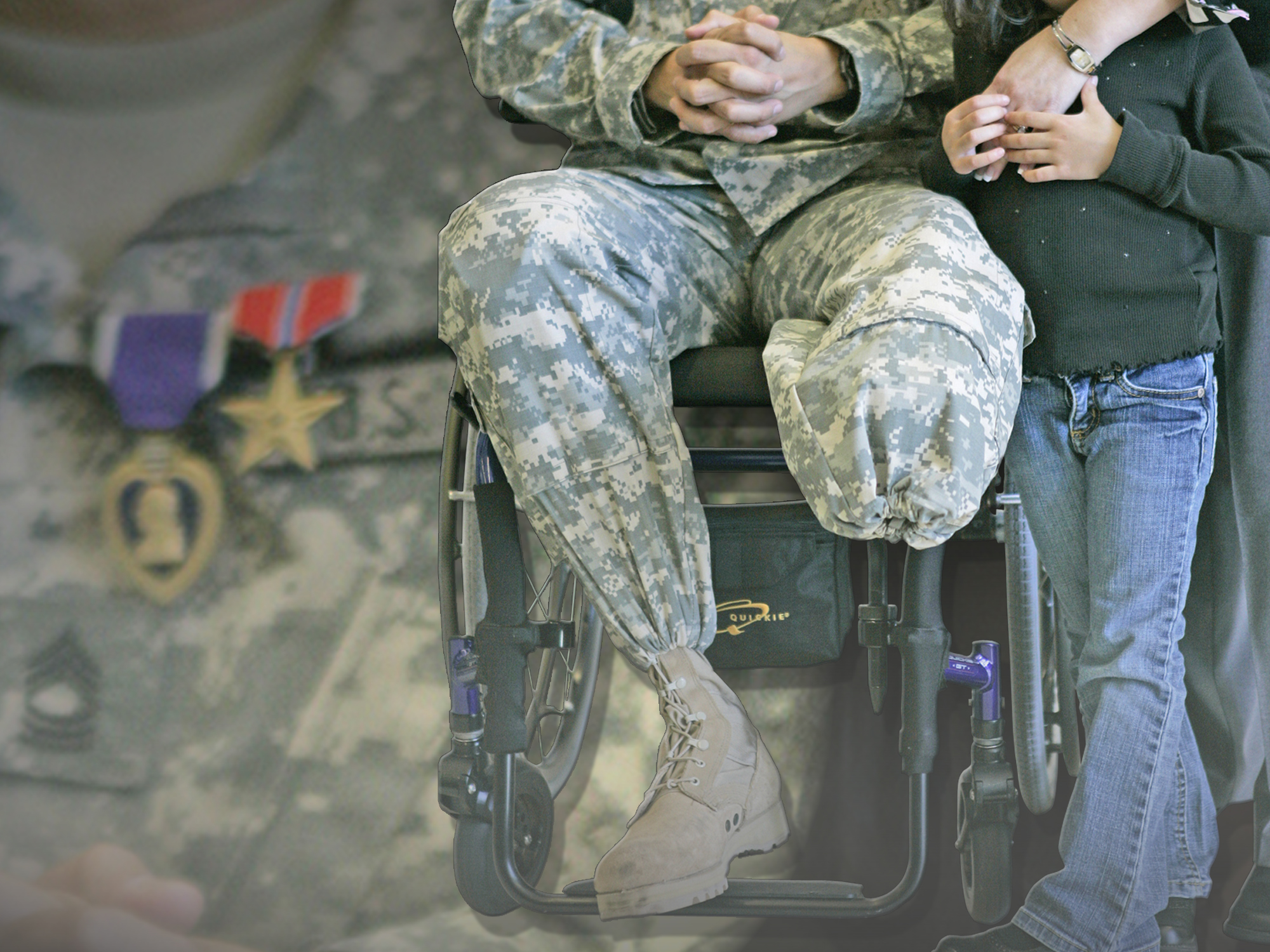
I’m also going to take a moment to pray for the Gold Star families who didn’t put on uniforms themselves, but stood at a graveside bidding goodbye to loved ones they can never hug again, and all the rest of the families of our soldiers, airmen, Marines, Coast Guardsmen, Sailors and National Guard. They have to hold down the fort while their sons, daughters, husbands, wives, mothers and fathers serve often half the world away for months or years at a time. They too have and are sacrificing to protect the freedoms we all hold dear. And most of all, keep those in prayer who are still suffering for having served. Men and women whose lives are haunted by what they saw and did and those who came home with life changing injuries. They are heroes one and all.
So, to all who serve – Thank you for your service and God Bless you.
Tuesday, October 31 2017
 This year was my first attending the Florida Writers Association annual conference and what a fantastic conference it was! I got to meet David Morrell, author of First Blood (which if you never read the book, turned into the movie Rambo with Sylvester Stallone.) and Steve Berry who's another international best seller of action, adventure, suspense. Both men gave excellent workshops that would have made going to this conference worthwhile all by themselves. But there were so many other great workshops and lectures. Best conference ever, for me, at least. This year was my first attending the Florida Writers Association annual conference and what a fantastic conference it was! I got to meet David Morrell, author of First Blood (which if you never read the book, turned into the movie Rambo with Sylvester Stallone.) and Steve Berry who's another international best seller of action, adventure, suspense. Both men gave excellent workshops that would have made going to this conference worthwhile all by themselves. But there were so many other great workshops and lectures. Best conference ever, for me, at least.
Meeting new authors and sharing ideas is always fun. Exchanging business cards and email addresses so we can stay in touch adds to my life as a writer, and I always come home excited to get back to my work in progress with new ideas and plot twists.
And the frosting on the cake was that my fourth Tide's Way novel took second place for Romance in the Royal Palm Literary Awards Competition. Just being a finalist was an honor, but placing was even better. Now I can barely wait for next year which promises to be even better!
  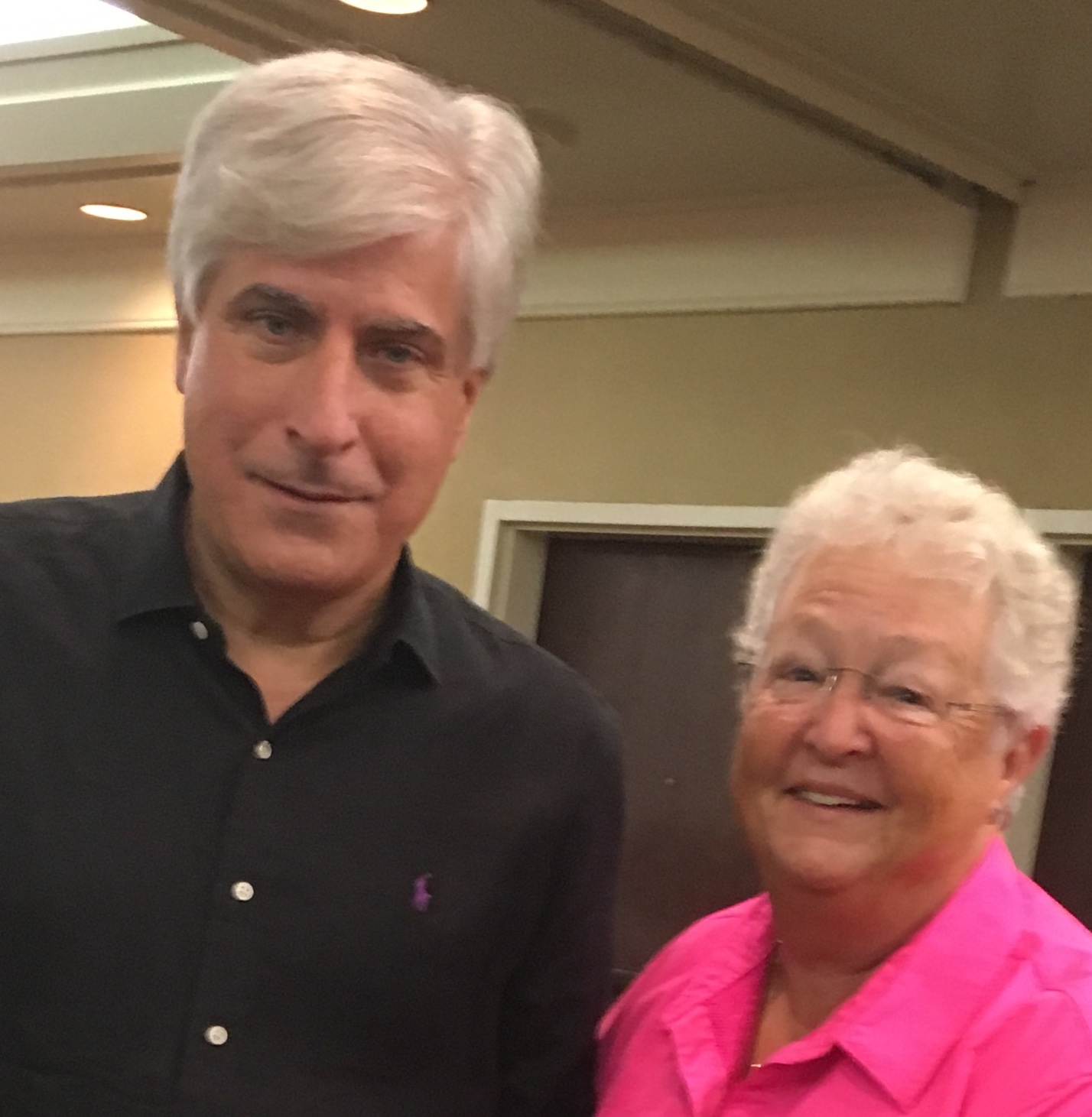
Until next year...
Saturday, October 21 2017

October’s Round Robin Blog subject is: In what time period do you prefer to set your stories – past, present, or future? What are the problems and advantages of that choice? Would you like to change?
I’ve written both historical and contemporary and enjoy both, but creating a world that has never existed requires a lot of imagination, and perhaps some seriously inventive ideas about what might be. Since I’m not a sci-fi reader, writing in the future would be difficult for me.
Historical settings interest me because I am intrigued by American and Scottish history. When I travel I enjoy visiting places of historical interest and I like to read about people and lifestyles of the past. The drawback to writing historical is that you have to do a ton of research and leave your twenty-first century assumptions behind. You don’t have to go back very far to run into pro blems. A reader of one book I set in 1972 wondered why this one character didn’t just call his wife’s cell when he needed to reach her. I had to point out to this woman, who happened to be my age, not someone born since the 70s, that cell phones did not exist back then, and that’s just one small thing. The further back you go, everyday life is impacted by things like outhouses, no central heating or air conditioning, iceboxes that actually had to have blocks of ice to keep food cold, perhaps no running water, no automobiles or trains. Far enough back and most people traveled on horseback or on foot and then there’s the issue of personal hygiene. When my parents were growing up they had to have a bath once a week whether they thought they needed one or not and in really cold climates, people donned their blems. A reader of one book I set in 1972 wondered why this one character didn’t just call his wife’s cell when he needed to reach her. I had to point out to this woman, who happened to be my age, not someone born since the 70s, that cell phones did not exist back then, and that’s just one small thing. The further back you go, everyday life is impacted by things like outhouses, no central heating or air conditioning, iceboxes that actually had to have blocks of ice to keep food cold, perhaps no running water, no automobiles or trains. Far enough back and most people traveled on horseback or on foot and then there’s the issue of personal hygiene. When my parents were growing up they had to have a bath once a week whether they thought they needed one or not and in really cold climates, people donned their  long johns in October and didn’t take them off until April. Babies were born at home and doctors of medicine didn’t even go to college. Just the minutia of day-to-day living has to be researched as well as the historical setting, the political and social issues of the day, like women’s roles in society and how out of place a woman of today would be. While historical books can bring worlds long since gone alive for the reader, they require a lot of research. long johns in October and didn’t take them off until April. Babies were born at home and doctors of medicine didn’t even go to college. Just the minutia of day-to-day living has to be researched as well as the historical setting, the political and social issues of the day, like women’s roles in society and how out of place a woman of today would be. While historical books can bring worlds long since gone alive for the reader, they require a lot of research.
 Contemporary settings also require some level of research, but the day to day living, how you get from here to there, how you fixed your breakfast, where you shop or grab a cup of coffee are all things we live with every day so we are not only familiar with them, we can write scenes where these things happen without ever thinking about it because we “live” it. There is still research to be done. Unless every character you write has the same jobs you or your spouse have, you need to research different careers. If you’re setting Contemporary settings also require some level of research, but the day to day living, how you get from here to there, how you fixed your breakfast, where you shop or grab a cup of coffee are all things we live with every day so we are not only familiar with them, we can write scenes where these things happen without ever thinking about it because we “live” it. There is still research to be done. Unless every character you write has the same jobs you or your spouse have, you need to research different careers. If you’re setting  it in the city you live in, again you are so familiar with the surroundings it’s easy to picture your characters existing there, but it’s also easy to assume your reader is as familiar with the setting as you and skip over the scene setting. If you choose a city you are not familiar with, Google and road trips are your friend. Another option is creating your own city, which requires some planning just so your story is consistent, but you can arrange it any way that works best for your story. it in the city you live in, again you are so familiar with the surroundings it’s easy to picture your characters existing there, but it’s also easy to assume your reader is as familiar with the setting as you and skip over the scene setting. If you choose a city you are not familiar with, Google and road trips are your friend. Another option is creating your own city, which requires some planning just so your story is consistent, but you can arrange it any way that works best for your story.  When I’ve set a story in a fictional setting, I draw a map of my fictional so I can picture it in my mind, which makes it easier to create it in words for my readers. But even with a fictional place, you need to do some research if you don’t live in an similar area. If you’re a city dweller and have been all your life, it’s going to be harder to create a small town, just as bringing the ambiance of a seaside village to life will be a challenge if you’ve never seen the sea. When I’ve set a story in a fictional setting, I draw a map of my fictional so I can picture it in my mind, which makes it easier to create it in words for my readers. But even with a fictional place, you need to do some research if you don’t live in an similar area. If you’re a city dweller and have been all your life, it’s going to be harder to create a small town, just as bringing the ambiance of a seaside village to life will be a challenge if you’ve never seen the sea.
 The adage ‘write what you know’ is very much a part of creating a believable setting for your story to take place so if you’ve never lived there, you should consider visiting such a place. If it’s in another time, then try reading journals or letters written by people of that era if possible. And if you are marvelously creative, then perhaps a setting in the future is your thing, but even here, you’d need to pay attention to what seems possible. There needs to be a leap of imagination and you need to give the reader the tools to make that leap. The adage ‘write what you know’ is very much a part of creating a believable setting for your story to take place so if you’ve never lived there, you should consider visiting such a place. If it’s in another time, then try reading journals or letters written by people of that era if possible. And if you are marvelously creative, then perhaps a setting in the future is your thing, but even here, you’d need to pay attention to what seems possible. There needs to be a leap of imagination and you need to give the reader the tools to make that leap.  Time travel plots have a similar challenge. We all know, or assume based on current knowledge, that time travel is not possible, so the author needs to give the reader a mechanism that makes the phenomenon possible: a time portal or a magic incantation, or if it’s sci-fi, a machine that has made it possible. Time travel plots have a similar challenge. We all know, or assume based on current knowledge, that time travel is not possible, so the author needs to give the reader a mechanism that makes the phenomenon possible: a time portal or a magic incantation, or if it’s sci-fi, a machine that has made it possible.
Would I like to change what I write? Not really. I love history, especially American history so setting a story in the past appeals to me and I love the research part of  writing the story. I also enjoy writing contemporary both in places I’ve made up like Tide’s Way North Carolina, and in real places like St Augustine where I currently live, or Boston, a city I grew up exploring. My most recent book was a little of both. It was a time travel inspired by one of my explorations of an island off the coast of Maine with a long and colorful history. Iain’s Plaid takes place partly on that island as it is today, and partly as it was in 1775 and in Boston just before the start of the Revolutionary War. It was a fun book to write, and according to my reviews, a fun book to read. writing the story. I also enjoy writing contemporary both in places I’ve made up like Tide’s Way North Carolina, and in real places like St Augustine where I currently live, or Boston, a city I grew up exploring. My most recent book was a little of both. It was a time travel inspired by one of my explorations of an island off the coast of Maine with a long and colorful history. Iain’s Plaid takes place partly on that island as it is today, and partly as it was in 1775 and in Boston just before the start of the Revolutionary War. It was a fun book to write, and according to my reviews, a fun book to read.
I hope you’ll check out these posts to see what other authors write and why they like or don’t like the time period.
 Marie Laval http://marielaval.blogspot.co.uk/ Marie Laval http://marielaval.blogspot.co.uk/
Anne de Gruchy https://annedegruchy.co.uk/category/blog/
Dr. Bob Rich http://wp.me/p3Xihq-14G
Anne Stenhouse http://annestenhousenovelist.wordpress.com/
A.J. Maguire http://ajmaguire.wordpress.com/
Judith Copek http://lynx-sis.blogspot.com/
Victoria Chatham http://www.victoriachatham.com
Beverley Bateman http://beverleybateman.blogspot.ca/
Heidi M. Thomas http://heidiwriter.wordpress.com/
Marci Baun http://www.marcibaun.com/blog/
Helena Fairfax http://www.helenafairfax.com/blog
Diane Bator http://dbator.blogspot.ca/
Rhobin L Courtright http://www.rhobinleecourtright.com
Saturday, September 23 2017
This month's Blog Hop topic is: What characters in other author's books have not left your mind? Have you written a character who wouldn't leave you? Why do you think this happens?
___
 Years ago, when I was maybe 8 or 9 years old, I read Heidi by Johanna Spyri and fell so in love with Heidi I wanted to be her. I remember lying in a sunny patch of carpet wishing with all my young heart that I could be her and live on that mountain in the Alps with the Grandfather and Peter. It didn’t happen, of course. I grew up, had a family of my own and have lived some amazing adventures (although I’ve never visited the Alps, at least not yet) but I have never forgotten Heidi and Peter. I could say it was because of the beauty of the alps, but I hadn't seen the movie yet. But I think it was because I have always yearned for adventure, to go somewhere different, experience something I haven't yet seen or done and Heidi's world was about as different as my middle class, suburban neighborhood as it gets. Years ago, when I was maybe 8 or 9 years old, I read Heidi by Johanna Spyri and fell so in love with Heidi I wanted to be her. I remember lying in a sunny patch of carpet wishing with all my young heart that I could be her and live on that mountain in the Alps with the Grandfather and Peter. It didn’t happen, of course. I grew up, had a family of my own and have lived some amazing adventures (although I’ve never visited the Alps, at least not yet) but I have never forgotten Heidi and Peter. I could say it was because of the beauty of the alps, but I hadn't seen the movie yet. But I think it was because I have always yearned for adventure, to go somewhere different, experience something I haven't yet seen or done and Heidi's world was about as different as my middle class, suburban neighborhood as it gets.
 As a teenager, I read a trilogy written about a girl, then woman who lived on an island on the Maine coast. Joanna Bennett was in many ways a lot like me, but I was always more smitten with Nils Sorenson, the boy, then man who loved Joanna and stuck by her through all her bad decisions and headstrong ways until she finally realized how much he meant to her and that all she had thought she needed meant nothing without him. I loved the coast of Maine even though I didn't live there and living on an island had a wonderful allure and Nils Sorenson was the kind of boy I wanted to meet and someday marry. I was too naive to consider what it would be like to be married to a lobsterman who got up before the sun and came home smelling of fish bait, but the steadfastness of his love for Joanna appealed to me. As a teenager, I read a trilogy written about a girl, then woman who lived on an island on the Maine coast. Joanna Bennett was in many ways a lot like me, but I was always more smitten with Nils Sorenson, the boy, then man who loved Joanna and stuck by her through all her bad decisions and headstrong ways until she finally realized how much he meant to her and that all she had thought she needed meant nothing without him. I loved the coast of Maine even though I didn't live there and living on an island had a wonderful allure and Nils Sorenson was the kind of boy I wanted to meet and someday marry. I was too naive to consider what it would be like to be married to a lobsterman who got up before the sun and came home smelling of fish bait, but the steadfastness of his love for Joanna appealed to me.
___
 Since then three characters, all male, have touched my heart and imagination and stayed with me long after I put the book down. The first was Jamie Fraser (Diana Gabaldon, Outlander) – long before Sam Heughan brought him to life in the Starz series. The second was Jessie Best (Pamela Morsi. Simple Jess) and most recently, Josh Caven (Cheryl Reavis, The Marine.) I think what made these characters so memorable for me was that all of them were strong male characters who loved fiercely, cared deeply, were honorable, selfless and brave, yet vulnerable and in one way or another were able to admit to that vulnerability and open themselves up to the women they loved. Don’t get me wrong, I love reading Jack Reacher’s exploits and he’s a hard character to forget, but the Reachers of this world don’t really need anyone. Jessie Best, Nils Sorenson, James Fraser and Josh Caven were men I would like had I met them in the real world, and they embodied all the things I valued most in a soul mate, husband and lover. Since then three characters, all male, have touched my heart and imagination and stayed with me long after I put the book down. The first was Jamie Fraser (Diana Gabaldon, Outlander) – long before Sam Heughan brought him to life in the Starz series. The second was Jessie Best (Pamela Morsi. Simple Jess) and most recently, Josh Caven (Cheryl Reavis, The Marine.) I think what made these characters so memorable for me was that all of them were strong male characters who loved fiercely, cared deeply, were honorable, selfless and brave, yet vulnerable and in one way or another were able to admit to that vulnerability and open themselves up to the women they loved. Don’t get me wrong, I love reading Jack Reacher’s exploits and he’s a hard character to forget, but the Reachers of this world don’t really need anyone. Jessie Best, Nils Sorenson, James Fraser and Josh Caven were men I would like had I met them in the real world, and they embodied all the things I valued most in a soul mate, husband and lover.
___
 None of the characters I've created have ever quite left me entirely, both male and female. I think this is partly because as the author, I spent months getting to know them. I knew them better than myself in some ways. I knew what hurt them and what healed them. I felt their pain and soared with their successes because I was there as their stories were unfolding and they shared with me, whispers while I was out walking, dreams while I drowsed and outright conversations while I worked. Of my books currently available, I think the two characters who stand out in my heart and head are Matt Steele, my protagonist in The Candidate, and Dani Amico, the heroine in Iain’s Plaid, for None of the characters I've created have ever quite left me entirely, both male and female. I think this is partly because as the author, I spent months getting to know them. I knew them better than myself in some ways. I knew what hurt them and what healed them. I felt their pain and soared with their successes because I was there as their stories were unfolding and they shared with me, whispers while I was out walking, dreams while I drowsed and outright conversations while I worked. Of my books currently available, I think the two characters who stand out in my heart and head are Matt Steele, my protagonist in The Candidate, and Dani Amico, the heroine in Iain’s Plaid, for  different reasons. Matt because his personal journey included a lot of research that brought back memories of the time when I was coming of age, a time of turmoil for our country and myself in so many ways. And Dani stays with me, because her story grew out of one of my own adventures. I went out sailing to explore an island full of history, walked over paths men and women trod for over 400 years, a place I'd only read about. But Dani got to go places I could never see except in my imagination. So, perhaps she is a little piece of me, and I in some ways am a part of her. different reasons. Matt because his personal journey included a lot of research that brought back memories of the time when I was coming of age, a time of turmoil for our country and myself in so many ways. And Dani stays with me, because her story grew out of one of my own adventures. I went out sailing to explore an island full of history, walked over paths men and women trod for over 400 years, a place I'd only read about. But Dani got to go places I could never see except in my imagination. So, perhaps she is a little piece of me, and I in some ways am a part of her.
___
I’d love to hear about the characters that you’ve met in books that have stuck with you. Please comment below and I'll draw one name from a hat and send either The Candidate or Iain's Plaid for your reading pleasure.
Check out some favorite characters these authors can't leave behind.
 Anne Stenhouse Anne Stenhouse
Heidi M. Thomas
Victoria Chatham
Diane Bator
A.J. Maguire
Judith Copek
Beverley Bateman
Fiona McGier
Rachael Kosinski
Rhobin Courtright
Tuesday, September 05 2017
 I'm sorry I haven't posted in awhile. I've been kind of distressed by all the hateful things I see on the news, on Facebook and in the media. Is this MY world? MY country? Instead of just protesting what we don't like, we riot, maim and kill. Now we are tearing down statues that commemorate our history, for either good or bad, but rioting or tearing down the statues won't change the history. And it won't change the way we view either other today either. It just makes the hate and victimhood go on. I got to wondering what we need to do to make our world better. And I realized it begins with being a good parent. I'm sorry I haven't posted in awhile. I've been kind of distressed by all the hateful things I see on the news, on Facebook and in the media. Is this MY world? MY country? Instead of just protesting what we don't like, we riot, maim and kill. Now we are tearing down statues that commemorate our history, for either good or bad, but rioting or tearing down the statues won't change the history. And it won't change the way we view either other today either. It just makes the hate and victimhood go on. I got to wondering what we need to do to make our world better. And I realized it begins with being a good parent.
 No one living today is responsible for things that happened before they were born, or even while they were growing up. NO ONE! Everyone, however, is a product of how we grow up and the things we learned as we grew. I am a baby boomer. I am in no way responsible for chauvinistic attitudes that were the norm in previous generations. My dad, was a chauvinist. He, with some reason, expected my mom to do all the “women’s work” around the house. Partly because that’s how he was brought up and partly because he was the sole breadwinner in our family. My mother chose to be a stay at home wife once WWII was over and she no longer needed to replace men in machine shops. So perhaps my father’s expectations were not so outrageous. My husband was a chauvinist. He grew up in a household similar to mine and he expected me, even after I joined the work force to add to our family income, to continue doing all the chores he grew up thinking were for women only. I am not responsible for the society mores of the generations that came before me. What I am responsible for is the generation that comes after me. No one living today is responsible for things that happened before they were born, or even while they were growing up. NO ONE! Everyone, however, is a product of how we grow up and the things we learned as we grew. I am a baby boomer. I am in no way responsible for chauvinistic attitudes that were the norm in previous generations. My dad, was a chauvinist. He, with some reason, expected my mom to do all the “women’s work” around the house. Partly because that’s how he was brought up and partly because he was the sole breadwinner in our family. My mother chose to be a stay at home wife once WWII was over and she no longer needed to replace men in machine shops. So perhaps my father’s expectations were not so outrageous. My husband was a chauvinist. He grew up in a household similar to mine and he expected me, even after I joined the work force to add to our family income, to continue doing all the chores he grew up thinking were for women only. I am not responsible for the society mores of the generations that came before me. What I am responsible for is the generation that comes after me.

My son is not a chauvinist. He learned long before his teenage years how to wash dishes and fix meals. He learned how to do his own laundry, including ironing his dress shirts. He learned how to replace buttons, bake a cake, make his bed, diaper a baby, care for a pet and dozens of other chores once considered women’s work. I was responsible for that. He’s a loving, generous husband today who fully supports his wife’s career. He has walked the floor at night with his crying infants, bathed them, fed them, took them shopping, to the library and the park and tucked them in at night. Not only am I responsible, at least in part, for the man my son has become, but he and I are responsible for the kind of man his son will become and the way women are regarded in generations to come.
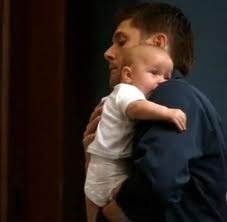
I’m not breaking my arm patting my back over my child rearing choices – what I am doing is using this as an example to show that changes in our culture and society don’t come about overnight simply because someone decides it’s more appropriate. Changes come because of the way we teach our young. Robert E. Lee, George Washington and others were not evil men – they were the product of their time. There were, undoubtedly, some very cruel and evil men who not only supported the institution of slavery, but were inhumane in their treatment of those they considered their property. But every white man or woman today is NOT responsible for the attitudes of both good and evil men of a hundred years ago and a society they had no hand in the making of. We aren’t responsible for the way people of color were treated in the sixties either. Nor should all of us be lumped together with the zealots, white supremacists and others who continue to hold those attitudes. What we are responsible for is the society we are creating for tomorrow. For our children and our childrens’ children.
 If we teach hate and intolerance, that’s what they will learn. We aren’t born bigots. We aren’t born hating others. We are taught. And that teaching has to stop. But it won’t stop because Black Lives Matter pickets and protests. It won’t stop if everyone who was born with white skin is expected to turn over everything they have to someone with black or brown skin. I realize bringing up a son who views women far differently than my husband or my father did is a lot different than bringing up children who don’t judge others by the color of their skin or the God they pray to, but it can start there. As parents we CAN change the world our children and grandchildren will live in. It won’t happen overnight, but if we teach love, tolerance and universal acceptance, it will happen. If we teach hate and intolerance, that’s what they will learn. We aren’t born bigots. We aren’t born hating others. We are taught. And that teaching has to stop. But it won’t stop because Black Lives Matter pickets and protests. It won’t stop if everyone who was born with white skin is expected to turn over everything they have to someone with black or brown skin. I realize bringing up a son who views women far differently than my husband or my father did is a lot different than bringing up children who don’t judge others by the color of their skin or the God they pray to, but it can start there. As parents we CAN change the world our children and grandchildren will live in. It won’t happen overnight, but if we teach love, tolerance and universal acceptance, it will happen.
We can’t just be color-blind, though. We have to be proactive about this. We have to talk to our  kids about racial diversity. Seems like this is often even harder than talking about sex, but it’s something we need to do. We need to make sure our children have the opportunity to meet and make friends with others of other cultures and skin color. It might mean going out of our way, but if that’s what it takes, then it’s imperative. It would have been a lot easier and quicker for me to sew that button on my son’s shirt or iron it for him than to patiently teach him how to do it and to be willing to praise his imperfect efforts and encourage him to keep trying, but he would never have learned if I hadn’t taken the time or gone out of my way to make it happen. Travel is a great way to experience other cultures and ways of living. If you don’t live where daily interaction is possible, then travel. Visit places where your children will have opportunities. kids about racial diversity. Seems like this is often even harder than talking about sex, but it’s something we need to do. We need to make sure our children have the opportunity to meet and make friends with others of other cultures and skin color. It might mean going out of our way, but if that’s what it takes, then it’s imperative. It would have been a lot easier and quicker for me to sew that button on my son’s shirt or iron it for him than to patiently teach him how to do it and to be willing to praise his imperfect efforts and encourage him to keep trying, but he would never have learned if I hadn’t taken the time or gone out of my way to make it happen. Travel is a great way to experience other cultures and ways of living. If you don’t live where daily interaction is possible, then travel. Visit places where your children will have opportunities.
And most of all, we have to teach love and respect. Love and respect for all mankind. Not just for those of a different color, but of a different faith, or ethnic background. If you want the world to be different in 25 or 50 years, start now helping your children to grow up with a new way of looking at the world they live in. This goes for parents of black children just as much as for those of white. If you teach your child they are a victim and fill them with resentment, that’s how they will grow up. Teach them instead to be proud of who they are and to believe they can be anything they want. Teach them that all white children, and all white people are not racist.
 I saw a meme on Facebook the other day that showed a sign in front of a church that read, “Love everyone, I’ll sort them out later. Signed God.” But that’s not right either. God created all of us in our rainbow of colors. He won’t be sorting anyone because He loves us all equally. For Christians – if you would be Christ in this troubled world, let’s start by loving everyone and teaching our children too. I saw a meme on Facebook the other day that showed a sign in front of a church that read, “Love everyone, I’ll sort them out later. Signed God.” But that’s not right either. God created all of us in our rainbow of colors. He won’t be sorting anyone because He loves us all equally. For Christians – if you would be Christ in this troubled world, let’s start by loving everyone and teaching our children too.
Saturday, August 19 2017
Our Round Robin Topic for August is - When you are stumped on moving a plot line forward, what do you do to reinvigorate your imagination and get your characters moving?
 What a great topic – I am eager to read all the tricks and methods other authors use to get past a roadblock. I’m sure it’s far less of a problem for those who carefully plot out their whole book before they begin to write, but every time I try to plot or outline, I end up stalled before I even begin. I’m a true pantser. I like to create characters I know well and then throw the inciting incident at them and see what they do next. Unfortunately that often leads to me wondering – what next? What a great topic – I am eager to read all the tricks and methods other authors use to get past a roadblock. I’m sure it’s far less of a problem for those who carefully plot out their whole book before they begin to write, but every time I try to plot or outline, I end up stalled before I even begin. I’m a true pantser. I like to create characters I know well and then throw the inciting incident at them and see what they do next. Unfortunately that often leads to me wondering – what next?
There are several options that I try. The first is to get out of my study and go for a walk. I take my characters and their situation with me. While I’m contemplating what next? I rehearse lengthy  dialogs between them, picture all kinds of things happening to them. It doesn’t matter how far out or impossible the situations my imagination takes me to. Most of what goes through my mind might never end up in the book, but it nearly always sparks a thought that becomes a springboard for what next? dialogs between them, picture all kinds of things happening to them. It doesn’t matter how far out or impossible the situations my imagination takes me to. Most of what goes through my mind might never end up in the book, but it nearly always sparks a thought that becomes a springboard for what next?
Another method is playing the “What If?” game. For example, I might have my hero and heroine sitting in a café with coffee steaming in front of them. They’ve been fighting and I’m not sure if this is where they make up or if they get up and go on their way with the problem unresolved. So I might ask myself, What if  an old boy/girlfriend showed up with an embrace and a kiss? Or what if the guy hauls out his wallet to drop a bill on the table before he storms out and discovers he forgot his wallet or his wallet is empty? What if she starts to get up, catches her foot on the chair and falls? What if a cop shows up to question one of them about a crime? What if a little kid at the next table pops up with a grin on his face and tells them they should be nice to each other? What if the hero spills his coffee and the scalding liquid flows into the heroine’s lap? The What if’s are endless and none might be the answer, but just starting to ask the questions and considering all the possible outcomes to each usually breaks the dam and suddenly I know exactly where this argument is going and how the scene should end or the next scene begin. an old boy/girlfriend showed up with an embrace and a kiss? Or what if the guy hauls out his wallet to drop a bill on the table before he storms out and discovers he forgot his wallet or his wallet is empty? What if she starts to get up, catches her foot on the chair and falls? What if a cop shows up to question one of them about a crime? What if a little kid at the next table pops up with a grin on his face and tells them they should be nice to each other? What if the hero spills his coffee and the scalding liquid flows into the heroine’s lap? The What if’s are endless and none might be the answer, but just starting to ask the questions and considering all the possible outcomes to each usually breaks the dam and suddenly I know exactly where this argument is going and how the scene should end or the next scene begin.
 Sometimes the roadblock needs for me to just go somewhere else and leave my characters in limbo while my brain takes a break. Go read a book, watch a movie, visit a friend, call family member for a chat. Then I come back to my story with a refreshed mind. Sometimes the roadblock needs for me to just go somewhere else and leave my characters in limbo while my brain takes a break. Go read a book, watch a movie, visit a friend, call family member for a chat. Then I come back to my story with a refreshed mind.
When all else fails, I take my problem to my brainstorming buddies. We call ourselves the Sandy Scribblers and we meet once a month to discuss our current works in progress. When I have a major roadblock, I present the  situation to my group and the what if game turns into a badminton game with ideas bouncing off everyone, growing and multiplying. Sometimes the ideas aren’t workable, or don’t fit the characters, but most of the time several possibilities come home with me and I am re-energized and eager to get back to writing with a whole army of possibilities whirling in my brain. situation to my group and the what if game turns into a badminton game with ideas bouncing off everyone, growing and multiplying. Sometimes the ideas aren’t workable, or don’t fit the characters, but most of the time several possibilities come home with me and I am re-energized and eager to get back to writing with a whole army of possibilities whirling in my brain.
When all of these options fail, I might sit back to wonder if I really had a story to begin with. Or were my characters as thoroughly thought out as they should have been? Have I missed something from the backstory that should have been there? Often I’ll find some piece to the larger picture that I’ve been ignoring and by focusing on it, the roadblock clears. What next? is the incorporation of that missing piece.
 One other habit I have as a writer is that I don’t always write in a linear fashion. Sometimes I see whole scenes or hear dialogs that I know don’t belong where I am currently in the story, so while they are fresh and vibrant in my mind, I open another file I call Bits and Pieces and just start typing, getting the whole scene or dialog down and then save it for later. Sometimes when I hit a roadblock, I visit the Bits and Pieces file and read through these various scenes or snatches of scenes and miscellaneous ideas and sometimes one of them is exactly what I need in my manuscript. If I’ve just written a thought or idea, I return to the main manuscript and try writing it. If it’s a detailed scene, I copy and paste it, then work out how to connect all the dots. And sometimes when I am at a crossroads and can’t think where to go next, I open the Bits and Pieces file and start typing something new that might or might not end up in the story, but the process encourages me and often when I return to the main document I suddenly realize I do know what next? One other habit I have as a writer is that I don’t always write in a linear fashion. Sometimes I see whole scenes or hear dialogs that I know don’t belong where I am currently in the story, so while they are fresh and vibrant in my mind, I open another file I call Bits and Pieces and just start typing, getting the whole scene or dialog down and then save it for later. Sometimes when I hit a roadblock, I visit the Bits and Pieces file and read through these various scenes or snatches of scenes and miscellaneous ideas and sometimes one of them is exactly what I need in my manuscript. If I’ve just written a thought or idea, I return to the main manuscript and try writing it. If it’s a detailed scene, I copy and paste it, then work out how to connect all the dots. And sometimes when I am at a crossroads and can’t think where to go next, I open the Bits and Pieces file and start typing something new that might or might not end up in the story, but the process encourages me and often when I return to the main document I suddenly realize I do know what next?
Want to know what some of my author friends do when they hit a roadblock? Check them out.
 Diane Bator Diane Bator
A.J. Maguire
Anne de Gruchy
Victoria Chatham
Marie Laval
Judith Copek
Dr. Bob Rich
Helena Fairfax
Fiona McGier
Heather Haven
Beverley Bateman
Rhobin Courtright
Tuesday, August 08 2017
My summer travels
 Every year since I moved to St Augustine I’ve returned to New England for six weeks to visit family and catch up with old friends. For the past three years, three of those weeks have been spent on Bailey Island in Maine, in a cute little cottage overlooking the ocean at the northern edge of Casco Bay. The time there starts with a bang, quite literally, for Independence Day. I get to watch fireworks from my deck from towns and cities all along the coastline as well as a spectacular display over the cove right down the street. My son and his family were up for a few days and this year we took a side trip to Fort Popham which happens to have a lovely beach nearby. For those of you who think the Maine coast is all rocks and ledges, there are many lovely fine sand beaches and Popham is one of them. I had my annual feasts of lobster fresh from the icy waters of Maine when they are at their succulent best, and lunches of Maine Gulf shrimp, another treat I never get in Florida. It was a lovely, relaxing visit. Every year since I moved to St Augustine I’ve returned to New England for six weeks to visit family and catch up with old friends. For the past three years, three of those weeks have been spent on Bailey Island in Maine, in a cute little cottage overlooking the ocean at the northern edge of Casco Bay. The time there starts with a bang, quite literally, for Independence Day. I get to watch fireworks from my deck from towns and cities all along the coastline as well as a spectacular display over the cove right down the street. My son and his family were up for a few days and this year we took a side trip to Fort Popham which happens to have a lovely beach nearby. For those of you who think the Maine coast is all rocks and ledges, there are many lovely fine sand beaches and Popham is one of them. I had my annual feasts of lobster fresh from the icy waters of Maine when they are at their succulent best, and lunches of Maine Gulf shrimp, another treat I never get in Florida. It was a lovely, relaxing visit.
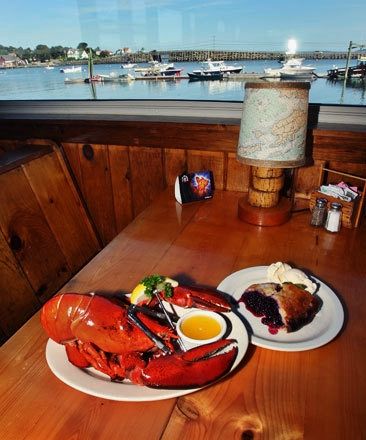 I returned to Massachusetts to take care of some of my dad’s business. He’s been in nursing care for the last year following a nasty fall and broken bones last July, and now is eligible for Medicaid, but that application process can be difficult so my sister and I consulted an advocate to help us get it right. It was also good to have time to visit with him and remember some of the good times we’ve had over the years. I returned to Massachusetts to take care of some of my dad’s business. He’s been in nursing care for the last year following a nasty fall and broken bones last July, and now is eligible for Medicaid, but that application process can be difficult so my sister and I consulted an advocate to help us get it right. It was also good to have time to visit with him and remember some of the good times we’ve had over the years.
Now I’m at the family place at Bow Lake in New Hampshire. We own a small island there which has a lot of charm . . . and a lot of drawbacks. No running water or phone, no hot showers and an outhouse, but it is all ours and we – my kids, my grandkids, my sister and her daughter and some of my inlaws all arrive here for one week each summer. Cousins get to spend time with each other, playing, swimming, boating, having sleepovers in each other’s tents and telling stories and making s’mores around a campfire every night. My children, close in heart, but separated  by distance most of the year, get to enjoy each other’s company and talk about everything from kids to politics, to sports and work and life in general and somehow the fact that we all have to sleep in tents and treat the tiny camp like a clubhouse doesn’t matter so much. Every year there’s a theme to our week, usually a holiday we never get to enjoy together. We’ve celebrated Valentine’s Day with little red mailboxes by every tent and the kids had fun making and delivering their messages. We’ve had Easter egg hunts and dressed up and gone trick or treating at everyone’s tent, too. This year is April Fools. This morning I woke up to find it had snowed right in by distance most of the year, get to enjoy each other’s company and talk about everything from kids to politics, to sports and work and life in general and somehow the fact that we all have to sleep in tents and treat the tiny camp like a clubhouse doesn’t matter so much. Every year there’s a theme to our week, usually a holiday we never get to enjoy together. We’ve celebrated Valentine’s Day with little red mailboxes by every tent and the kids had fun making and delivering their messages. We’ve had Easter egg hunts and dressed up and gone trick or treating at everyone’s tent, too. This year is April Fools. This morning I woke up to find it had snowed right in 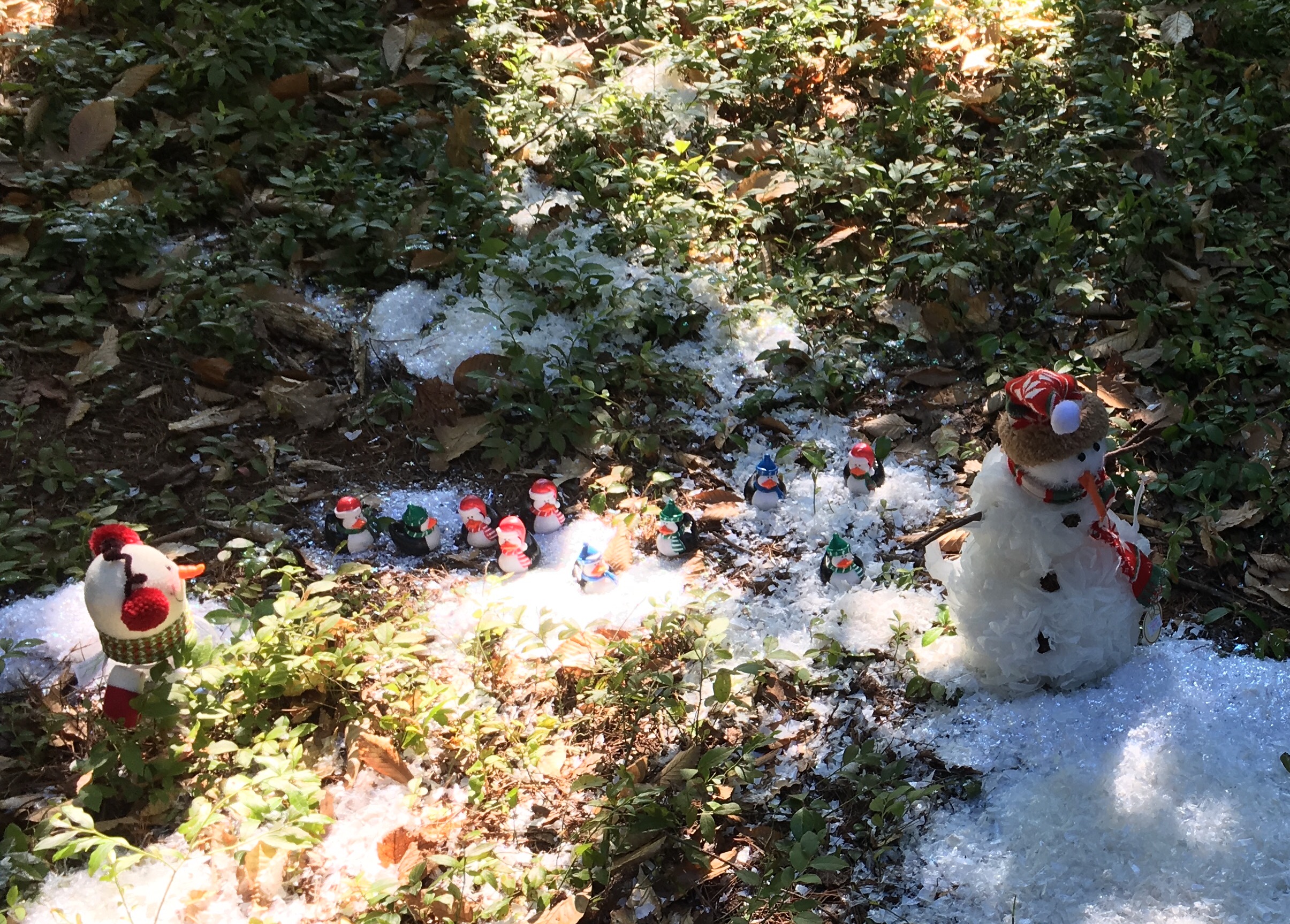 front of my tent and there were little snowmen, snowballs and duckies with woolen hats and scarves. Who knows what will happen the rest of the week. front of my tent and there were little snowmen, snowballs and duckies with woolen hats and scarves. Who knows what will happen the rest of the week.
Next week my summer journey will be over and I’ll head back to St Augustine. It will be good to be home once the long drive is over, but it’s always worth the trip. Family time always is.

Tuesday, August 01 2017

Trusting Will is ON SALE from August 1st to 15th - just 99¢ on all e-book platforms
Amazon Barnes & Noble Kobo iBooks Google Play
TRUSTING WILL Brianna is a war widow with no intention of falling for Will Cameron no matter how charming he is. He’s just another bigger-than-life hero who puts his life on the line every day. Loving him could break her heart all over again.
.
.
.
.
.
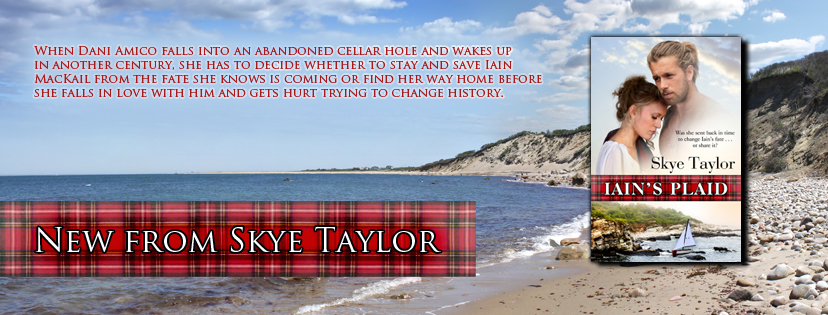
Iain's Plaid has been chosen to compete in the AllAuthor August Cover Contest - We'd love to have you pop on over and give it a vote: https://allauthor.com/cover-of-the-month/824/
Hope everyone is having a great summer - next week, I'll share some of my summer adventures with you.
|